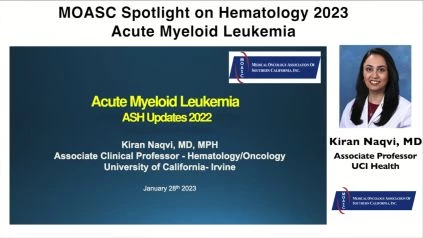Myelodysplastic Syndromes Treatment Update for 2023 ASH AML Inotuzumab Update [Slides] – Kiran Naqvi, MD MOASC
By Kiran Naqvi, MD
So today my talk was mainly highlighting the ASH abstracts or ash highlights of 2022. And I had the pleasure of presenting several abstracts, actually all of them, which I felt were really important. But some of the few that I wanted to mention that I think are important now is that we have really good experience with chemotherapy in our younger patients. And with the combination of Cytarabine, with Idarubicin or Anthracycline. But now we need to talk more about how to improve in terms of triplet therapy where, you know, combining Venetoclax with chemotherapy or combining Venetoclax or other targeted agents with hypermethylating agents we really feel that triplet therapy is now probably the next step that we all should take towards and obviously incorporate targeted therapies in this triple therapies. The other thing that I really found interest in doing this star during this ASH presentation was the role of Magrolimab in patients with TP53 mutated AML. I think the results from the phase two study from MD Anderson were very encouraging and we are hoping to see some really good results from the enhanced study that is currently enrolling through Gilead.
What surprised you most about these acute myeloid leukemia (AML) clinical trials?
What’s surprising to me, what I would say, not surprising, but what’s most interesting to me about all the clinical trials that are going on in acute myeloid leukemia is that we are now drifting or trying to drift away from chemotherapy, which is more toxic with more side effects and trying to incorporate more targeted therapy in our, in our treatment regimen.
Less toxicity, more specific effect on the leukemia cells. And and that kind of brings us to the topic of, doing all these testing, finding mutations, what mutations can we target successfully so that the patients can benefit and go into remission?
Watch and Share the Video with Slides Here: https://oncologytube.com/v/41744
What is myelodysplastic syndromes (MDS)?
Typically myelodysplastic syndromes (MDS), the spongy tissue within bones (bone marrow) generates:
-
red blood cells to transport oxygen throughout the body
-
white blood cells to aid in infection defense
-
platelets to aid in blood clotting
In MDS (myelodysplastic syndromes), however, the bone marrow fails to produce enough of these healthy blood cells (Eg. a white blood cell, a red blood cell, not a dysfunctional blood cell), be it red blood cells or white blood cells. Instead, it generates aberrant or abnormal cells, incompletely formed cells (immature) and could cause low blood counts. These are often found through a simple blood test.
Your bone marrow is eventually taken over by immature, dysfunctional white or red blood cells as the illness progresses.
They press out the healthy cells, decreasing the quantity of cells that are able to enter the bloodstream flowing through the blood vessels.
The disorder can grow slowly (indolently) or rapidly (aggressively), with these risk factors in certain cases it can progress into acute myeloid leukemia (AML) and affect a patients life expectancy.
So what are your hopes for the continued clinical trial research studies in acute myeloid leukemia (AML)?
Oh, the hope is high I think there’s so much going on right now in acute myeloid leukemia (AML). In terms of research, as I already mentioned, triple therapy, Nero and TP53 mutations, and also IDH inhibitors. Which and Flit three inhibitors, which constitute, a good number of our a m L patients, 20 to 30%. So I think a combination of targeted therapy with chemo or less intense therapy is the way to go in the future.
Do you have anything to add as a closing statement about these myelodysplastic syndromes (MDS) clinical trials?
I’m just very excited, I’m looking forward to all the results from the phase three studies that are comparing the combination of targeted therapies versus standard of care. So yes, there’s so much that is being done and we hope to hear on some of these studies pretty soon.
Kiran Naqvi, MD – About The Author, Credentials, and Affiliations
Kiran Naqvi, MD, is an Associate Professor and board-certified hematologic oncologist at UCI Health. Her areas of clinical expertise include acute myeloid leukemia (AML), myelodysplastic syndrome (MDS), chronic myelogenous leukemia (CML), bone marrow aspiration, and bone marrow transplantation.
Pakistan’s Dow University of Health Sciences in Karachi is where she received her medical degree. She did an internal medicine residency at the University of Illinois Urbana-Champaign and the Carle Foundation Hospital in Urbana, Illinois, followed by hematology-oncology fellowships at Baylor College of Medicine and the University of Texas MD Anderson Cancer Center, both in Houston, Texas.
Reference
NHS – Myelodysplastic syndrome (myelodysplasia). NHS, March 11, 2021

